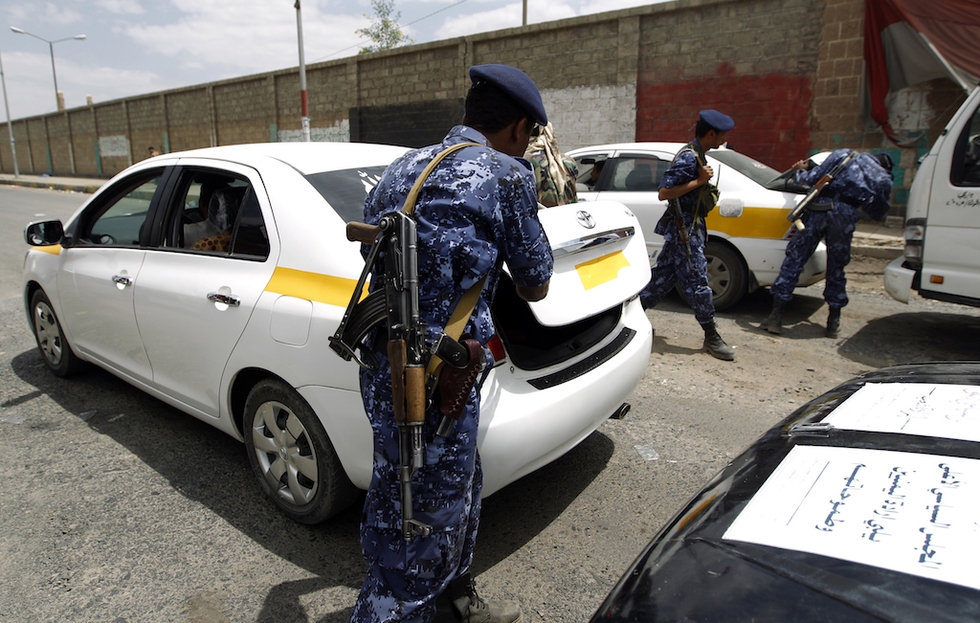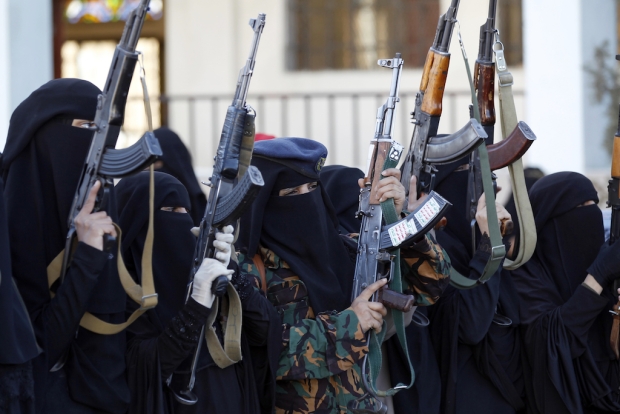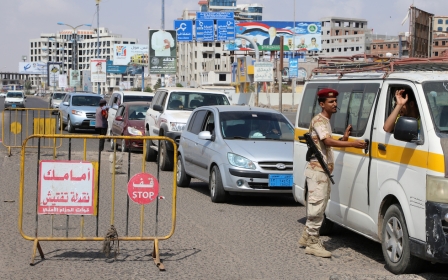Yemen's smugglers use women to avoid checkpoint searches

TAIZ, Yemen - Women are being increasingly used by smugglers in Yemen to bypass military checkpoints because male personnel are often unwilling to conduct body searches.
In both areas controlled by Houthi rebels and areas controlled by forces supporting President Abd Rabbuh Mansour Hadi, conservative social attitudes lead to women going unsearched through checkpoints.
They have therefore become ideal candidates for smuggling drugs, weapons and other illicit items across the war-ravaged country.
Elham Abu-Bakr told Middle East Eye that she had managed to smuggle five guns, belonging to her brothers, from the southern city of Aden to the capital Sanaa, without one checkpoint stopping her car for inspection.
"My brothers know that the soldiers in the military checkpoints do not inspect women or their bags, so when they decided to transport their personal arms from Aden to Sanaa, they assigned me to this task," she said.
Since the beginning of the armed conflict in 2015, many checkpoints were set up on the main roads between provinces to inspect passengers.
There are hundreds of women who were arrested while they were working in transporting hashish or drugs and sometimes help gangs of thieves in different provinces
- Nabil Fadhil, Yemeni Organization for Combating Human Trafficking
"In the beginning I was worried, but my brothers encouraged me, confirming that the military checkpoints will not stop me," said Abu-Bakr.
"So I agreed to do the task because there was no other choice."
In June 2017, Abu-Bakr put the guns inside her bags and under the seat of her brother's car. She travelled from Aden together with her brother and her sister-in-law.
"When the soldiers in the checkpoints see women inside the car, they do not stop the car, so we passed through dozens of checkpoints - both of the Houthis and pro-government forces - and no one stopped us for inspection."
Abu-Bakr said she believed that the respect shown to women at checkpoints was a positive behaviour by warring sides.
"It is a good thing that warring sides are still respecting women and even if women smuggle the weapons of their relatives, there is no problem because these are their own weapons," she said.
"But there are tribal men who [use women to] smuggle huge quantities of arms and no one stops them."
Exploitation of women
The hundreds of checkpoints set up between provinces during the last three years of war have made it more difficult for gangs to smuggle hashish, drugs and other forbidden items, leading some gangs to resort to exploiting vulnerable women to do the work, according to Nabil Fadhil, the head of the Yemeni Organisation for Combating Human Trafficking.
"Some smugglers have exploited needy women to smuggle forbidden items like drugs from one province to another," he said.
"The number of those women has increased during the last three years because of economic crisis and the increase of checkpoints."
He said some of those women fled from their families, while others engaged in such work after they told their families they would work trading legal items like perfumes.
"It is good that the military checkpoints respect women but sometimes they are the reason for the exploitation of women," Fadhil added.
In July, the security forces arrested a gang of thieves, including a woman who stormed a bank in Aden and tried to rob money
- Brigadier Abu Mashaal al-Kazimi, Taiz police
"Hundreds of women were arrested while they were working in transporting hashish or drugs and sometimes helping gangs of thieves in different provinces."
He said those women mainly belonged to poor families and their families could not help them out of prison and to give up such work, so there were many women in prison.
"I hope that some organisations help the women in prisons and provide them with a legal source of incomes that can help their families," he said.
Aden's deputy police manager, brigadier Abu Mashaal al-Kazimi, confirmed to MEE that the police in Aden had arrested dozens of women while they were smuggling forbidden items and weapons. Some of them participated in the robbery of exchange companies.
"In July, the security forces arrested a gang of thieves, including a woman, who stormed a bank in Aden and tried to rob money," he said.
He stated that the investigations with the women were still ongoing, adding that the security forces in Aden are cautious and they can arrest the suspected people whether men or women.
'Men are always sinful'
Women's rights activists have blamed the domination of women by men in Yemen's highly patriarchal society for the increase in female smugglers.
Mona Mohammed, an activist in Taiz, said the male smugglers defame women and were guilty of leading women into illicit activity.
"Men are always sinful because women in Yemen are only followers to men and they cannot disobey the directions of men, so there are some absurd men who force women to do their dirty work for the sake of money," she told MEE.
Mohammed, who has been involved in implementing projects in the city of Taiz educating women about their rights, said men were responsible for the illegal work carried out by women because women in Yemen cannot disobey them.
"When the security forces arrest a woman, they should look for the man behind her, because women do not dare to do illegal work in a conservative society like Yemen," she said.
In the past, Yemen had female security personnel, but after salaries were stopped, many left their jobs to find more sustainable work.
One former female soldier in Taiz province, Raafa Abdullah, told MEE she stopped working as a soldier in one of the main checkpoints at the entrance of Taiz city in August because she did not receive her salary.
"When the Houthis invaded our city, I joined the Popular Resistance to participate in the liberation of Taiz and I worked at checkpoints in more than one area inspecting women who enter and leave the city," she said.
Abdullah worked without a salary for more than six months, and was unable to eke out a living for her family. Eventually she gave up her job at the checkpoint and went to work in agriculture.
"I want to serve my city but without money my family will starve to death - most of the female soldiers stopped working and went to look for other work. I am working in helping the tomatoes farm in al-Akhmoor area," she said.
Currently there are no female soldiers standing at checkpoints in the whole province of Taiz, and while some male soldiers replaced the women at the checkpoints, they cannot perform the same role as the women.
"During my work in checkpoints, I found weapons including bombs with women, but the men did not find anything with women because they cannot inspect women," Abdullah added.
Abdullah was a soldier under the leadership of Brigade 17 with some other female soldiers, but they left the brigade gradually and the last female soldier quit in August.
Abu-Bakr agreed with Abdullah that there should be female soldiers at least at one checkpoint at the entrances of the province, but they should allow men to transport their personal weapons.
"There are weapons in all Yemeni houses, so when people move from one province to another they need to take their weapons with them," she said.
"So authorities have to find a solution for this issue and then set up checkpoints for women."
This article is available in French on Middle East Eye French edition.
New MEE newsletter: Jerusalem Dispatch
Sign up to get the latest insights and analysis on Israel-Palestine, alongside Turkey Unpacked and other MEE newsletters
Middle East Eye delivers independent and unrivalled coverage and analysis of the Middle East, North Africa and beyond. To learn more about republishing this content and the associated fees, please fill out this form. More about MEE can be found here.





